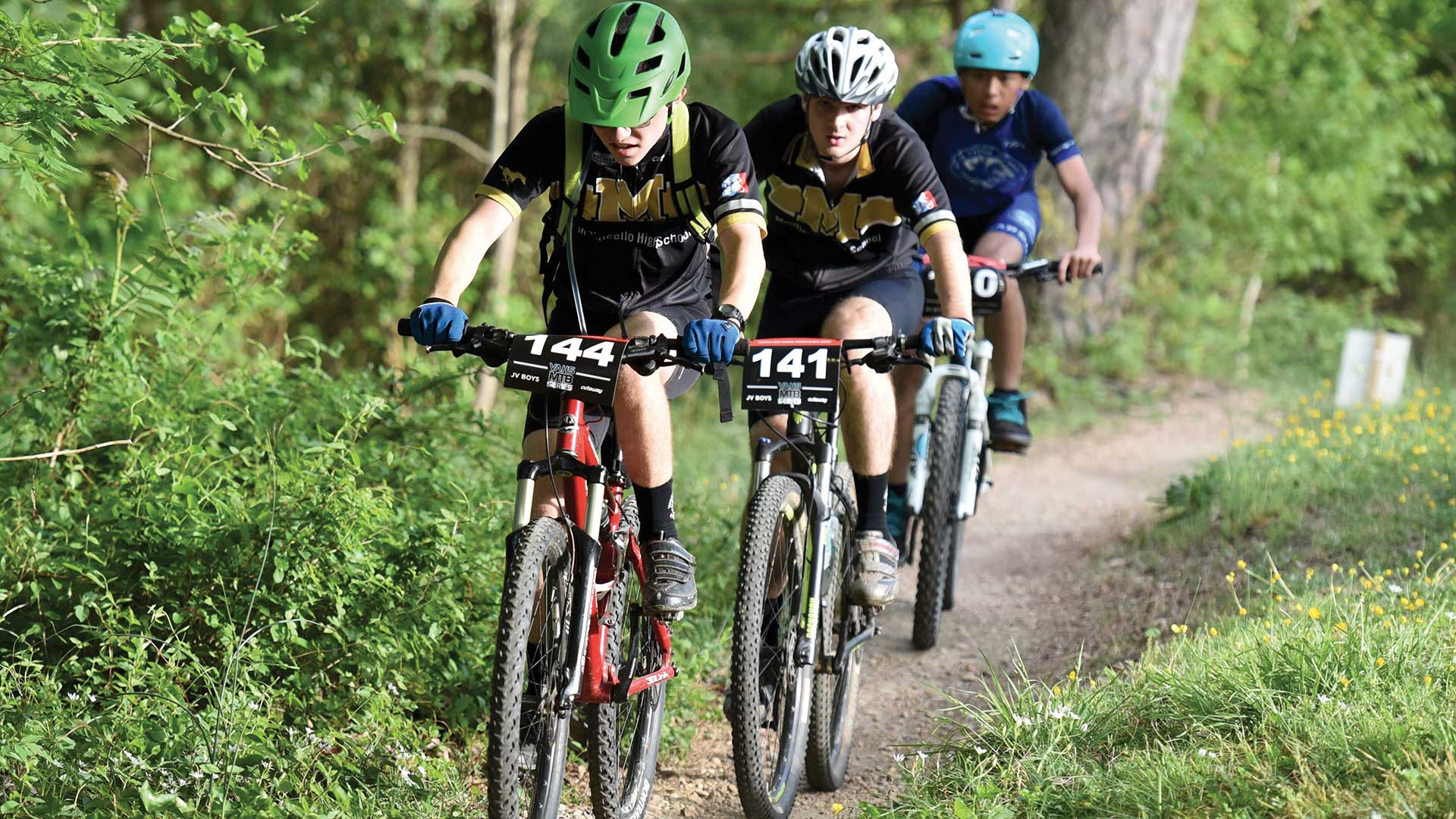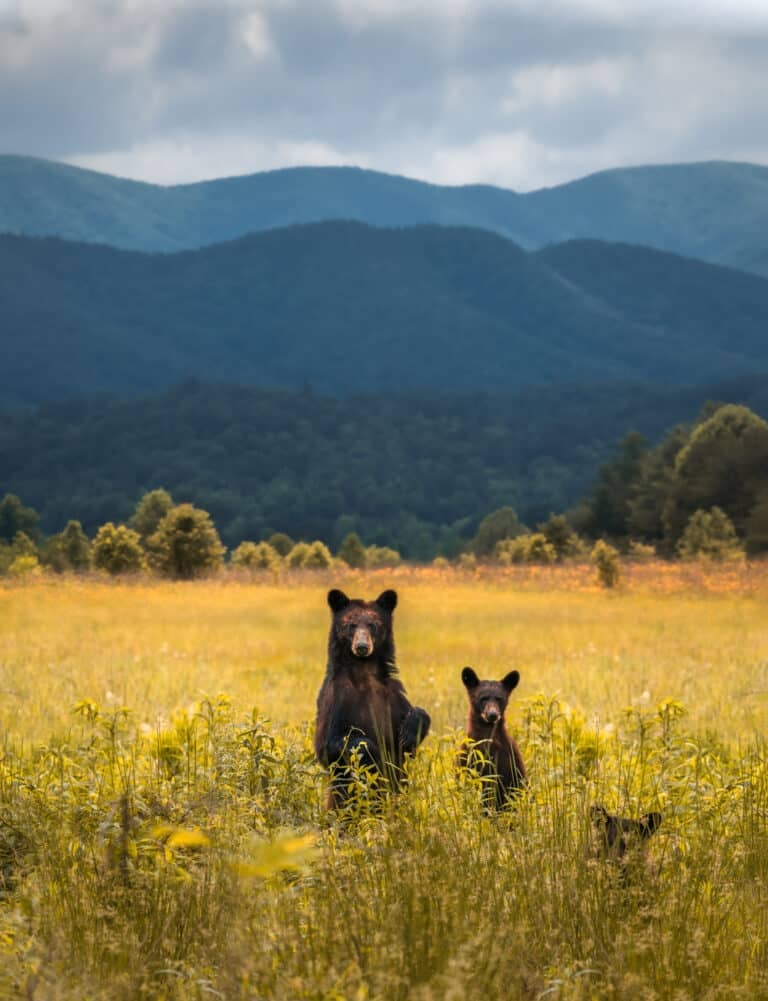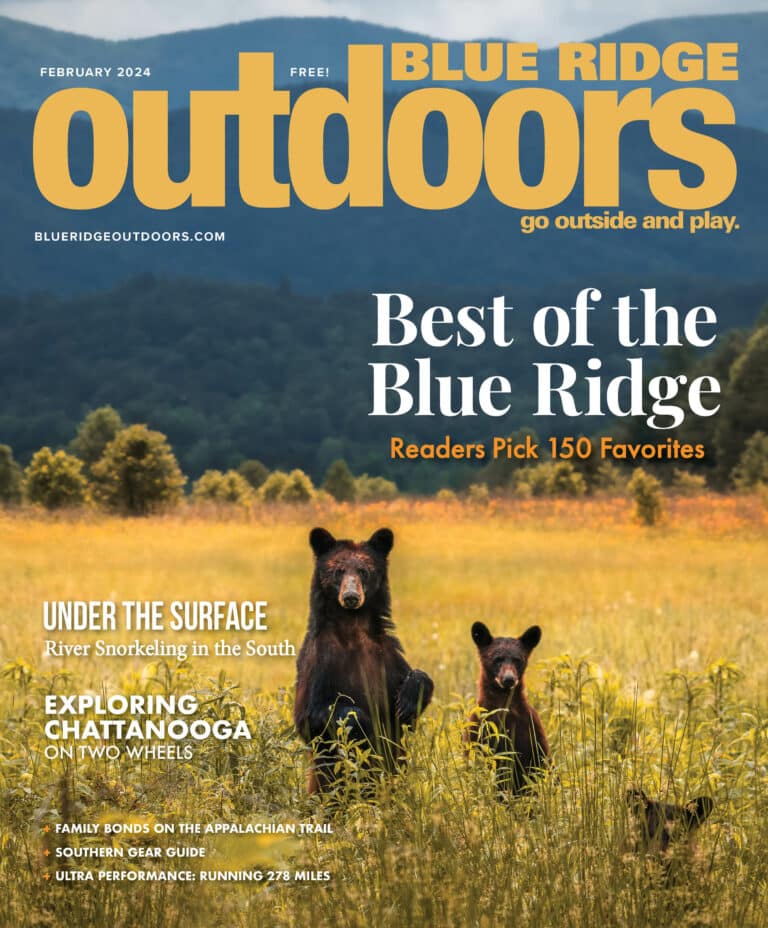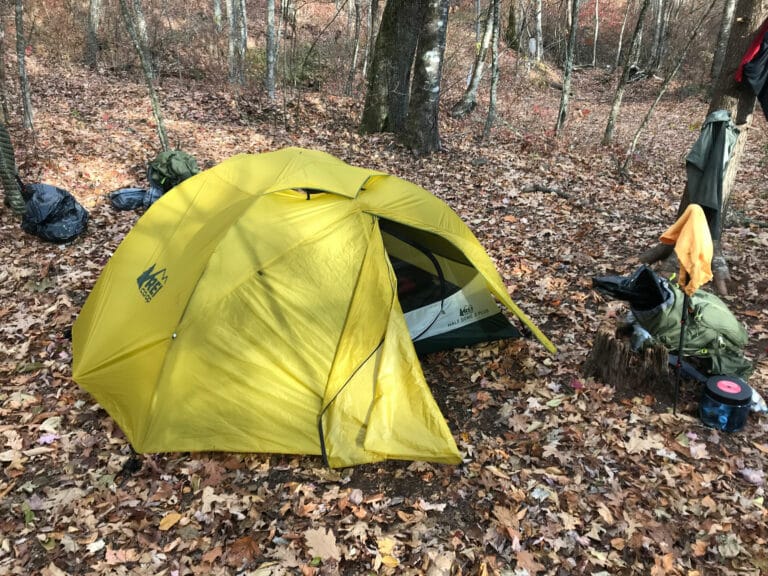In recent years, the experiential education movement has surged in popularity. We looked to our literal backyards of Charlottesville, Va., and Asheville, N.C., to see how the movement is providing more outdoor opportunities for middle and high schoolers and what that’s doing for the next generation of leaders.
Pulling into the Miller School of Albemarle (MSA) campus outside of Charlottesville, Va., I get the distinct sense that I’ve entered the real-life equivalent of Hogwarts, except this is a school for cyclists, not wizards. Palatial brick buildings sprout from manicured lawns. A bell chimes overhead in a stately clock tower. Purpose-built trails beckon from the forest’s edge. And there, just beyond the swimming pool and the baseball diamond, rise the Blue Ridge Mountains.
“It would have been like having a school on the North Shore of Oahu and someone saying, maybe we should start a surf team,” says MSA Dean and Endurance Team founder Peter Hufnagel. “We’re sitting here with 1,600 acres of beautiful land perfect for trails, we have endless country roads surrounding the campus. The setting really lent itself to this program.”
Nearly 10 years ago, Hufnagel started the cycling program with the assistance of his wife Andrea Dvorak, who was racing bikes professionally at the time. That first year, Hufnagel was able to coax just a few off-season cross-country kids into riding some gravel roads, but from those humble beginnings has grown an internationally recognized program that now supervises 28 student-athletes from around the world.
The clock chimes. It’s 3 p.m., and the bike rack outside of the Endurance Team building starts to stack up with Specialized bikes. Dvorak and Andy Guptill, the Endurance Team Director, confer with students as they don pink kits and top off tires. Lucas Mariutti, a junior from São Paulo, Brazil, is ready to roll. He tells me he tried lots of sports—soccer, swimming, even BMX—but none resonated so much as road and mountain biking.
“It’s a lot of suffering, but it’s fun,” he says. “It’s taught me to never give up, cliché as that sounds. That’s what cycling’s all about. Just keep going, even if it hurts.”
Mariutti doesn’t have ambitions to go pro with his riding, but his teammate Katie Clouse is already riding professionally. Originally from Park City, Utah, the 16-year-old is one of the most decorated junior cyclists in the country. She has 21 National Championships under her belt and is consistently a top 10 contender in all three cycling disciplines—cyclocross, mountain, and road.

She’s not heading out with the rest of the team today. Just days ago, she returned from the cyclocross World Championships in Valkenburg-Limburg, the Netherlands, where she finished in the top 25. She is the youngest rider in history to make a U-23 World Championship team.
Of course, she mentions none of that when I ask about some of her proudest cycling achievements. Overstatedly modest, charming, and bubbly, Clouse seems like any other teenage girl when she’s off the bike, but instead of going shopping on the weekends, she’s taking the cycling world by storm.
“I had always done public schools before, but racing at a national level and traveling so much, teachers sometimes didn’t get it and they would be hard on me,” she says. “School is definitely still my top priority and the teachers here work really well with me.”
Later this spring, Clouse will head to Europe with the National Team to race for two weeks against some of the world’s most elite road riders. Her journey embodies the pinnacle of achievement for a student-athlete on the MSA Endurance Team. And while the school’s cycling program is truly one of a kind, both nationally and internationally, Hufnagel was not the first to envision a high school adventure program.
Back in the early 1960s, James G. “Pop” Hollandsworth developed a mountaineering program at Asheville School, a private high school in Asheville, N.C. The program is still thriving under the leadership of Matt Christie, who says every student at the school is exposed to the outdoors from day one, whether they want it or not.
“We take all of our freshmen into the woods for three days for an orientation backpacking trip,” he says. “We live in an incredibly beautiful place and for a lot of these students, just to be in the woods and revel in that beauty is something they wouldn’t necessarily get if they just stayed here on campus.”
Alumni of the Asheville School’s mountaineering program have the potential to walk into college with a breadth of hard skills, from combat rolls to anchor building. But at its core, says Christie, the mission of the program is to help students rise to their potential, and outdoor adventure sports by their very nature provide ample opportunities to gain that conviction.
“We rely on our older students to help teach new students, and it’s a whole lot harder to teach something than just to do it,” he says. “I really think it allows them that leadership role within our program that they might not necessarily get in the classroom.”
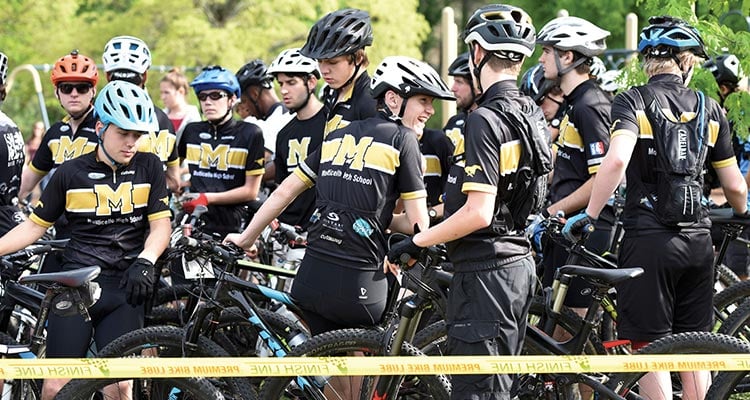
Closing the Gap: Going Public
Though private schools like Miller and Asheville have been at the frontlines of providing adventure alternatives to traditional team sports, it’s clear the tide is changing. Within the past decade, charter and public schools nationwide have been adopting their own programs, from clubs and competitive teams to experiential academic offerings.
For an industry criticized as being accessible only to the white, middle and upper-middle class, the explosion of outdoor opportunities for public school youth couldn’t be more welcome. The widespread success of the National Interscholastic Cycling Association (NICA) in particular has skyrocketed the movement—just last year, every public high school in Virginia’s Albemarle County started NICA teams.
That’s something Monticello High School’s head coach Sam Lindblom never could have anticipated just three years ago, when he launched Albemarle County’s first public high school NICA team.
“We were charting new ground. We walked into it—I wouldn’t say blind—but I would compare us to the Bad News Bears,” he says. “We were underfunded, understaffed, underskilled, and underequipped, but we did it.”
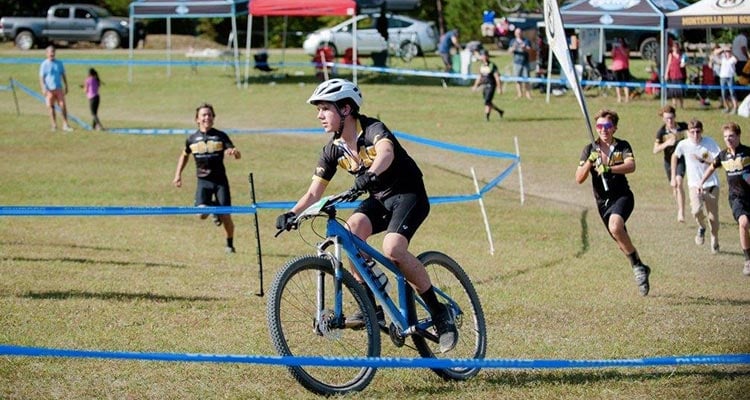
With support from parents, local businesses, and Monticello’s athletic director, Lindblom was able to string together a 14-person team that first year. Now, they’re up to 17 riders, including 16-year-old Jay Beck. Like so many kids, Beck had tried traditional team sports like baseball, lacrosse, and soccer, but only because it was required by the private school he attended. When he got a mountain bike in middle school and started racing for Blue Ridge Cyclery’s youth development team, Beck says he finally felt like he belonged.
“It’s something that has definitely changed my life,” Beck says. “There is really good sportsmanship toward other people. With other sports, competing against other people was a little harsh. There would be rivalries on the court or in the field. But in mountain biking, even if you’re on the opposite team, yeah you’re competing against them but they’re encouraging you at the same time.”
Beck’s mother, Beth, has been able to witness that good-natured competition first-hand from the sidelines. She says that mountain biking, more than any other sport, has done so much for Jay in the way of building confidence, maintaining fitness, socializing, and striving for goals.
“His coaches range in age quite a bit and they’re all out there mountain biking all the time,” she says. “That’s a great example to the kids that you can do this for a long time. Jay’s even talked about trying to ride in college, and that’s been a big motivating factor. He wasn’t too jazzed on thinking about college before.”
Despite the success of the team and the overwhelming support from Monticello, working within the context of the public school system has its own set of challenges, namely, finding funding. Lindblom’s team is limited in size not due to a lack of interest but to the financial barrier that prevents many students from getting into the sport.
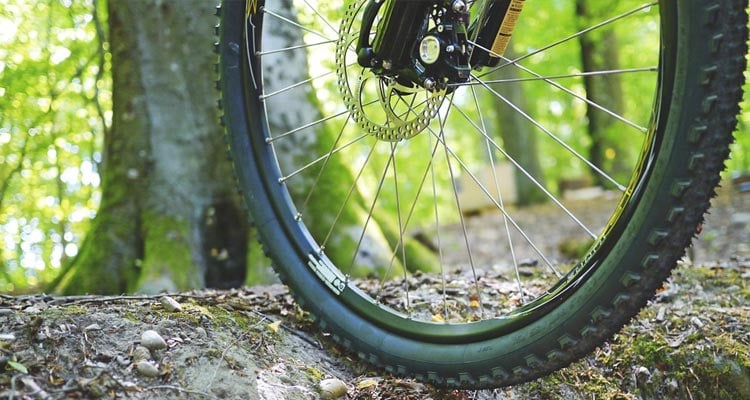
“Here’s the only thing I don’t like about this program—it’s resource and equipment intensive,” he says. “You have kids who are winning these races on 20lb carbon fiber mountain bikes that are $3,000 to $5,000 each. That’s not attainable for a lot of people. And then these kids are growing so you buy this expensive bike and then they grow out of it so you have to buy another one. We gotta be able to bridge that financial gap and we’re not doing it yet.”
It is this that Dr. Gordon Grant, Director of Education for the North Carolina Outward Bound School (NCOBS), has yet to reconcile. Grant has decades of experience working both as an outdoor educator but also as a teacher and principal in North Carolina’s public schools. Grant is a staunch advocate for experiential education, and says that every child should be able to have the opportunity to get outdoors, regardless of socioeconomic background.
“My outdoor experiences began like so many people in western North Carolina at Camp Mondamin and that was one of if not the most fundamental educational experiences of my life,” he says. “One of the reasons I really wanted to serve public education is, let’s face it, I led a privileged life. I wanted to be in public schools so I could share that and open up those opportunities to kids who might not immediately have that. What’s good for the privileged is good for all.”
“Public schools generally have it harder because they serve many masters, and state legislators are passing laws that mandate a tremendous amount of attention to test results.”
In the mid-1990s, Grant—then a public school teacher considered by many to be ahead of his time—applied for and received a meager $2,000 grant to establish a French Broad River curriculum. Throughout the year, he took his seventh-grade class to the river’s headwaters and followed it downstream, incorporating academic lessons in science, math, history, and language arts along the way.
According to Grant, that course was the essence of low hanging fruit: teachers taking students on more field trips and sooner in the year. He considers it counterproductive to wait until the end of the year to take field trips; the earlier kids get out in the world and establish hands-on experiences that they can reference later, the better their retention and level of understanding will be.
Fortunately for Grant, the administrations he worked for were supportive of his ambitious albeit unconventional goals. Yet even today, with countless studies proving the direct correlation between physical fitness and academic performance, public school teachers have their work cut out for them when it comes to convincing the powers-that-be that getting outside of the classroom is a positive thing.
“Public schools generally have it harder because they serve many masters, and state legislators are passing laws that mandate a tremendous amount of attention to test results,” says Grant. “What it comes down to is how willing is the institution that you are in to commit resources to these experiences that will pay off as far as character attribute development?”
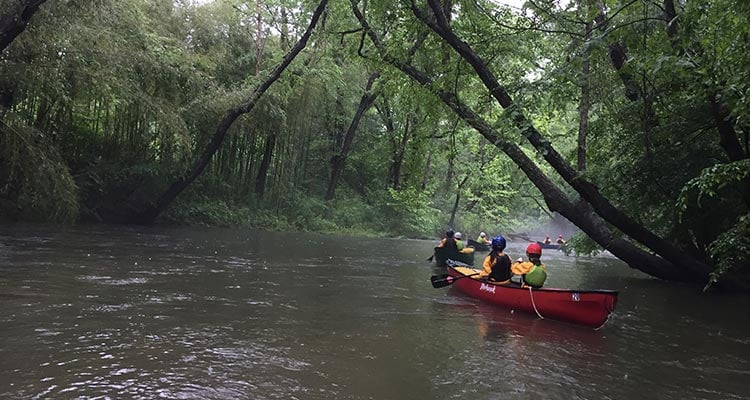
Grit and Good Grades
Over at Evergreen Community Charter School in Asheville, N.C., Adventure Coordinator Doug White has the unconditional support of his peers. Though his main duties involve getting kids outdoors by riding bikes, swinging from the ropes course, or scaling the school’s climbing wall, he’s been known to (safely) put power tools in the hands of 11-year-olds and give them free rein to create.
“Kids are capable of far more than adults and society give them credit for, and if you give them the opportunity to do it, nine times out of 10, they do it and they do it really well.”
Like Grant, White worked in the public school system in Haywood County after teaching at-risk youth through Outward Bound. Unlike the traditional approach to education, Evergreen’s model of pursuing “a holistic education of mind, body, and spirit,” gives kids the chance to ask questions, make mistakes, and ultimately, take a small slice of autonomy over an education that for so long has been dictated to them.
“Just the other day we had kids using flint and magnesium to make primitive fires. You can absolutely see that boost in confidence and self worth when a kid makes a fire. That kid is walking taller, smiling bigger, and moving through life in a different way.”
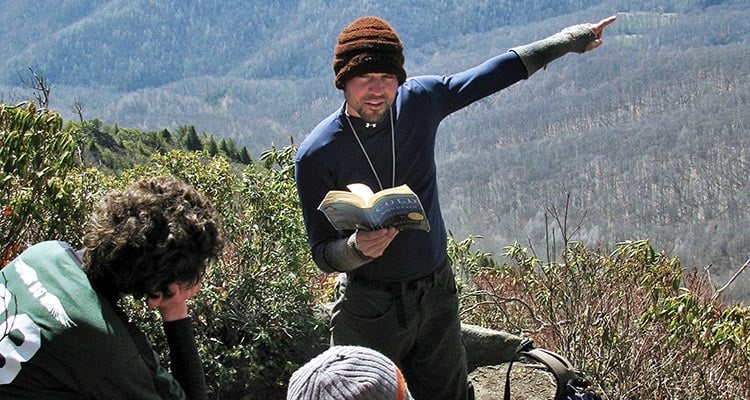
White’s also found that kids who might not previously have expressed interest in learning eventually come around when they’re given the freedom to ask questions and pursue what piques their curiosity. It’s that Socratic-like method of teaching that is at the core of Outdoor Academy. Based in Pisgah Forest, N.C., this unique live-in semester school for tenth graders encourages students to re-engage with their education and learn alongside their instructors.
“Our class sizes have a one-to-four ratio, and what that means is there’s no place to hide, there’s no back of the classroom in an Outdoor Academy class,” says Outdoor Academy Director Roger Herbert. “All of our classes are delivered experientially to the largest extent possible with an interdisciplinary approach. What that does is it asks our students to reimagine that relationship between a student and a teacher. Especially when you go backpacking with them or rock climbing or paddling, you can have conversations on the trail that you’d never have in the classroom. It’s a real mentorship.”
Anyone who has spent any amount of time in the outdoors knows the benefits of it are far and wide. In a group setting, adventures can establish social networks, develop teamwork and trust, and create an overall sense of belonging. Individually, outdoor activities can relieve stress, improve confidence, boost attention rates, and instill grit.
But now, there are numbers to back up the claims that exercise in general improves academic performance, too. Researchers at the University of Illinois studied eight- and nine-year-olds involved in an after-school exercise program. After a full school year, the results showed that the children in the after-school program were more physically fit and performed better at cognitive tasks than the control group of students.
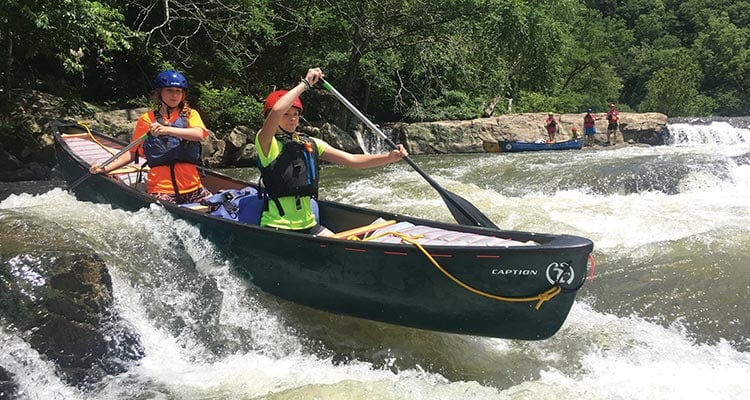
French Broad River Academy (FBRA) Executive Director and Founder Will Yeiser sees that very study playing out on his Asheville campuses each year. Initially started in 2009 as a school for boys, the private middle school now offers a girls’ program. Between the two campuses, the academy serves over 140 students.
At least one day a week, the students are out of the classroom and in the field. To be clear, these field “lessons,” as opposed to “trips,” are not free days off from school. In every experience, whether it’s skiing the local mountain or paddling down the French Broad River, there is an academic tie-in.
While other schools cite testing pressures as obstacles to getting kids out of the classroom, FBRA has the test scores to support Yeiser’s faith in the experience-based model. In the 2016/2017 school year, the percentage of sixth and seventh grade FBRA students who scored at or above the average grade level exceeded more than twice that of students statewide. Additionally, over 85% of FBRA graduates test out of freshman-level math and biology.
“The overwhelming feedback we get from our students about ninth grade is that it’s a breeze,” says Yeiser. “If anything, they are over prepared.”
FBRA often gets a reputation as being a “hardcore outdoor bootcamp,” says Yeiser, but the reality is that many students go on to pursue completely different paths—alumni of the school include a Navy SEAL trainer and a musician, for example.
“We encourage them to explore their passions and understand that failure is the ultimate teacher,” says Yeiser. “Finding out what you don’t like is equally as valuable as finding out what you do like.”
At Odyssey High School in Asheville, students spend every Wednesday outside of the classroom either on expedition or engaged in service. On expedition days, students hike, mountain bike, climb, raft, among other experiences. This time spent developing outdoor leadership provides students with opportunities to develop a rich relationship with the natural world.
On service days, faculty and students partner with area non-profits to offer service. They clean trash out of rivers, pack food for undernourished children, and work to end poverty, among other projects. Time spent in Asheville’s broader community helps students build greater self and social awareness and develop a sense of civic engagement, community, and social justice.
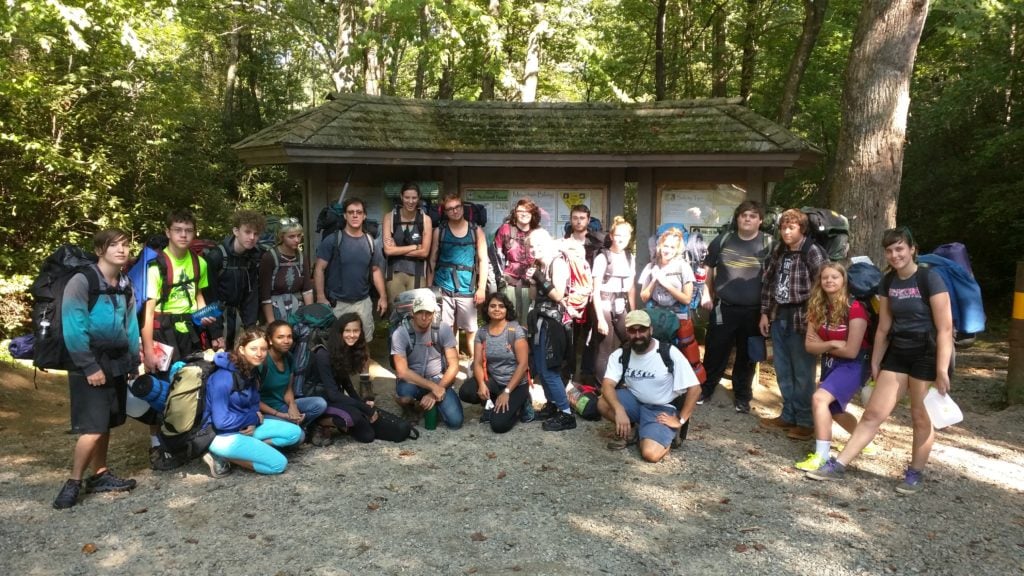
Last year, Odyssey students hiked to Craggy Gardens, Catawba Falls, Bearwallow, Hooker and Triple Falls, and Graveyard Fields. They went caving and rafted the French Broad several times, both for fun and as river clean-up in partnership with Asheville Greenworks. They explored geocaching and learned the basics of climbing at Climbmax. And they spent time at Brother Wolf, Manna Food Bank, and MountainTrue, along with longer service projects working with the local non-profit 12 Baskets serving food to the homeless in downtown Asheville or on Franny’s Farm, a local organic farm that provides learning experiences for children.
This coming year, Odyssey will offer longer experiential seminars to help students become more proficient at wilderness survival, rock-climbing, biking, rock climbing, kayaking, paddleboarding, and canoeing.
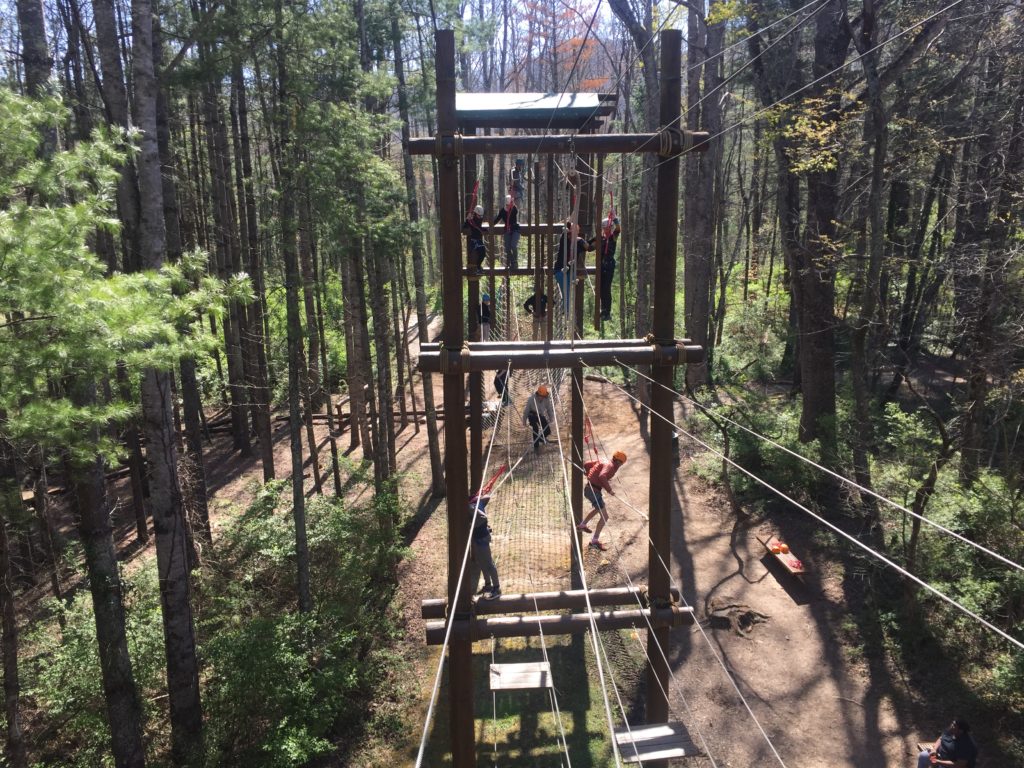
Tools for Life
Blue Ridge School’s Director of Outdoor Programs Tony Brown is considered by many to be the grandfather of youth cycling in central Virginia. He was an instrumental voice in establishing the Virginia High School Cycling League, and for the past two decades, he has been building trails and introducing young guys to the outdoors at the Blue Ridge School in St. George, Va.
More than the studies and the statistics, getting into the mountains is a spiritual matter for Brown. That’s why he requires all of his students to participate in a 12-hour, overnight solo on the school’s 800-acre property.
“They’re a pretty teched-out generation,” he says. “If you can teach students the importance of a walk in the woods, that’s something they can carry on for life.”
The Blue Ridge School also has a NICA team, which competes in the spring and the fall against schools like Monticello and Miller. Some of his most successful students have been the stereotypical jocks who took his mountain biking course on a whim and found something on the bike that spoke to them in a way that, say basketball, never had before.
“That win-or-lose pressure is not present in the outdoors,” says Brown. “The performance takes a backseat to the experience and the experience is so real that all kinds of other things come out—teamwork and leadership and taking a risk and facing a challenge or being afraid of something or doing it and falling down and getting back up. That’s what life is all about. It’s an up and down battle. You have to roll with the punches. Sports can teach you that as well, but in the outdoors, there’s not the pressure to win. Students need that.”
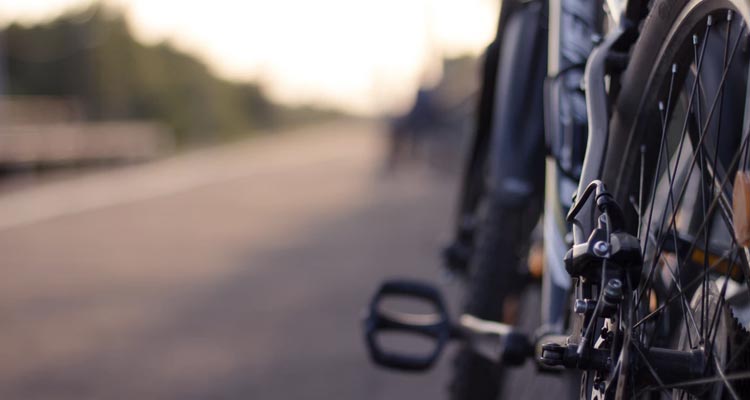
Less than 100 miles east of Blue Ridge School’s campus, Richmond Cycling Corps (RCC) founder and former professional cyclist Craig Dodson is using the bike as a tool for building confidence and tenacity, sure, but his main goal is of a much taller order: getting Richmond’s inner-city kids out of public housing.
It’s a seemingly impossible task—Fairfield Court where Dodson does most of his outreach is one of Richmond’s poorest neighborhoods. Crime, violence, poverty, and drugs are daily realities for the kids who live here. Less than a mile from downtown Richmond, the neighborhood feels worlds away.
After retiring from the pro circuit in 2010, Dodson started RCC, the nation’s only competitive cycling program designed specifically for youth living in public housing. He hustled for financial support from big corporations and private donors, secured bikes from Kona, spare parts from Shimano. That first year, undoubtedly at the hands of serendipity, Dodson was able to connect with a particularly troubled 15-year-old whose brothers ruled the streets. By the end of RCC’s first season, the boy was able to ride 100 miles in a day.
The momentum has only continued to build. By 2012, Dodson’s team had three kids as young as 14 riding 100 miles in a day. Four years later, RCC was consistently ranking third in the state of Virginia, with two riders swiping state championship titles. Last fall, Dodson opened the doors to his very own private school, Legacy Academy. The school is situated just 10 blocks from where the students live, offers only mountain biking for sports, and for the six kids on roll call, serves as the last chance for them to graduate high school on time.
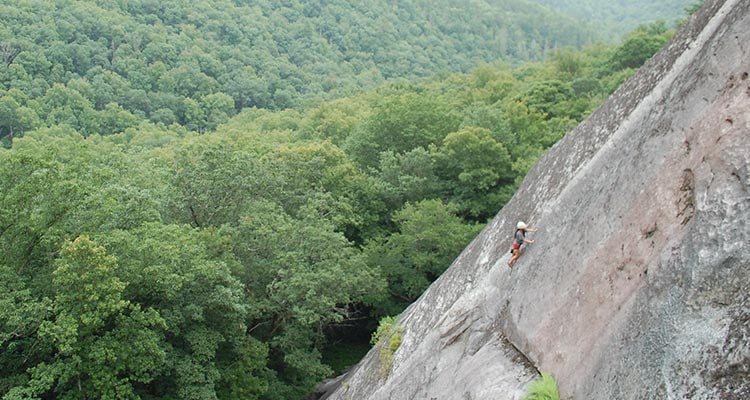
“These kids are going through literally the worst schools in the state of Virginia and are living in the most marginalized communities,” he says. “We have two kids in lock up right now. A kid who raced all last year has a house bracelet on. Two kids were shot in the leg last year. It’s rough. It’s not all the hallmark stuff people see at the races where they show up and it looks good and wholesome. About 90% of the work we do has nothing to do with bicycles.”
It’s tireless work. Most days, Dodson is more of a father figure than a high school mountain bike coach. He’s answered calls at 2 o’clock in the morning, rushed to the emergency room, bailed kids out of jail. But he can’t give up, and he won’t, because everybody else has. That’s why the RCC motto is, “Can’t stop. Won’t stop.”
His all-in energy and tough love approach is contagious and, arguably, exactly what these kids need. After working with some of them for eight years and watching the oldest in his program successfully graduate and move out of public housing, Dodson says there’s no doubt the bike is doing good, but it’s certainly not solving all of their problems. At the very least, the bike serves as an outlet and a unifying thread that brings together these otherwise fractured lives.
“I could be on the airplane and if I sit next to a marathon runner, that runner and I are going to have something in common because we know what it’s like to suffer, to do this thing that is self-driven. It creates a common bond. These kids pick up on that. They each know what it’s like to suffer on that mountain bike and to train and to do it even if they don’t really like it. It’s counter-culture to every part of their environment, their school, their family, but that brings them together.”
Dodson is not in the business of giving hand-outs to his students, which is why the bike is the textbook complement to his grassroots outreach: coaches can push you to ride, teachers can urge you to learn, but the only person who can pedal that bike or put in the work to graduate on time is the rider, the student.

Down in Candler, N.C., social studies teacher Heath Alexander is teaching that very lesson through rock climbing. In the spring of 2015, Alexander started a climbing club, dubbed the Guild of Mountaineers-Enka (GOME), at Enka High School. The school sits just outside of Asheville, N.C., and at the base of Pisgah National Forest, but prior to Alexander’s club, his students had no idea what world-class recreational resources lay beyond their back doors.
Creating a gear-intensive club on a shoestring budget hasn’t been easy. For starters, Alexander volunteers his time after school hours and sometimes even on the weekends. He is constantly applying for grants and hunting for opportunities to raise money. He even got his own commercial driver’s license so he could take a school bus without going through the rigmarole of reserving a driver.
But for all of the extra work, the payoff has been tremendous. He’s had students at risk of failing out of school altogether find their home in the climbing club, graduate, and continue climbing in college. One student in particular progressed his climbing so much so that his senior project involved swapping leads with Alexander up The Glass Menagerie (5.13a) at Looking Glass.
“Throughout school, someone’s been holding your hand the whole time,” he says. “That’s why I like working with this age group. They’re close enough to being mature adults that they understand the seriousness of what they’re doing and they take ownership in that. Here’s this rock. It’s up to you to get to the top. You have to place your own gear and make your own anchors. Nobody’s going to take care of you if you can’t handle it, and that’s a good lesson to have in high school as you’re about to go into the world.”
Responsibility. Sense of place. Leadership. Resolve. Discipline. These are just a few of the character attributes the next generation can be building through outdoor adventures of any kind, be they competitive or recreational. And whether the programming comes with a fat budget or is scraped together as a labor of love, the important point according to Dodson is to get kids out there. No excuses.
“If you’re expecting the public school system to pick up the tab for a mountain bike team, I think you’re delusional. Funding should never be a reason to not do something. You don’t have to be on the best equipment. Just get kids started.”
